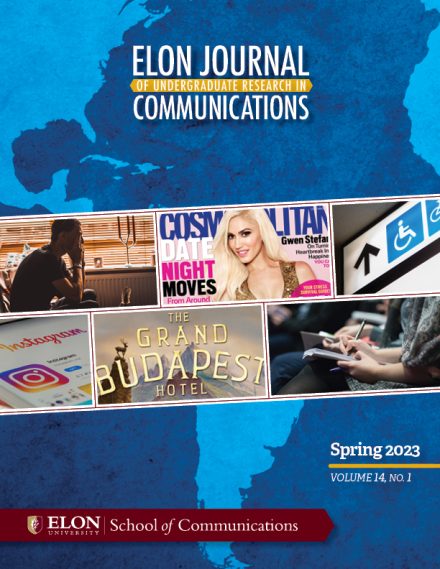In the most recent edition of the Elon Journal, six student researchers conducted an expansive look at the media and its wide-ranging influence – positively and negatively – on the health and mental well-being of their audiences.
The School of Communications has published the spring 2023 issue of the Elon Journal of Undergraduate Research in Communications, featuring student research on topics ranging from how news organizations report on depression to an analysis of disparities in internet access for disabled and vulnerable people.

The issue contains six research papers authored by School of Communications students, with the media and its wide-ranging influence on the health and mental well-being of their audiences serving as the issue’s dominant theme, according to Professor Harlen Makemson, who serves as the journal’s editor.
Three authors incorporated quantitative content analysis to examine the language choices journalists make when reporting news and information. Jake Twer compared how news organizations cover depression, discovering that traditional antidepressants are framed more negatively than ketamine treatments, which are not FDA-approved. In a similar manner, Molly Craig analyzed crime coverage in The Baltimore Sun both before and after the newspaper apologized for a historical pattern of racial bias in its coverage. Craig found evidence that reporters were following the outlet’s promise to “do better” by the paper’s editorial board. Meanwhile, Anna Cave analyzed Cosmopolitan magazine and discovered that its cover blurbs regarding sex had transitioned through the decades from sexual empowerment, to female objectification, and then to inclusiveness for all sexual identities.
In contrast, Diana Lynch utilized a qualitative content analysis to explore 10 narrative films with prominent bisexual characters. She found common themes of bisexual erasure, the unfaithful lover, oversexualization of bisexual women, and negative sentiments toward bisexual men, each of which could be harmful to those who identify as bisexual.
As part of her research on social media usage, Olivia Nevin employed focus-group methodology, finding that cognitive needs, social integration, and tension-free needs were the main reasons college students used social media during pandemic lockdowns in 2020. Furthermore, Nevin found that social media habits have changed dramatically since the pandemic.
Lastly, Lindsay Bennett conducted a secondary statistical analysis on a decade of national survey data, revealing a lasting disparity in the internet access that disabled people have in comparison to the rest of the population. However, there was a steady decrease in the gap between disabled and non-disabled people in terms of their proportion of internet access at home.
“While these authors have tackled seemingly disparate topics, their collective work is connected by what Elon values in undergraduate research – curiosity, diligence, attention to detail – and also a remarkable sense of empathy,” wrote Makemson in his From the Editor message.
For the spring 2023 issue, Makemson assembled an editorial board of 27 communications faculty members who participated in the multiple blind-review process to select the best student work.
The Elon Journal began in spring 2010, with spring and fall editions each year. The spring 2023 journal marks its 27th edition. For the first time, the journal is fully online, with each individual research paper available on its own respective webpage – increasing the content’s accessibility. Previously, past issues were mainly archived and shared via PDFs.
The Council on Undergraduate Research catalogs more than 200 student research journals in the nation, and the Elon Journal is one of the few that focuses on undergraduate student research in journalism, media and communications.


